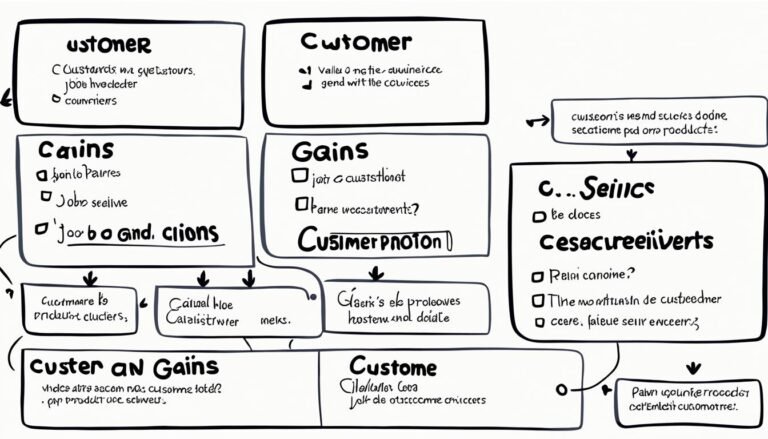Unlock Sales Team Motivation Psychology Secrets
Motivating sales teams is essential for driving performance and achieving sales success. Understanding the psychology behind sales team motivation can unlock the secrets to maximizing their potential. By delving into the factors that influence employee motivation, such as social influence, the need for affiliation, and recognition, leaders and managers can implement effective strategies to inspire and energize their sales teams.
In this article, we will explore the psychology of sales team motivation and uncover valuable techniques and strategies for keeping your sales team motivated and performing at their best. From employee motivation strategies to creating a positive work environment, we will provide practical insights that can drive sales team performance and enhance overall organizational success.
Key Takeaways:
- Understanding the psychology of sales team motivation can help you unlock their full potential.
- Social influence, the need for affiliation, and recognition play significant roles in motivating sales teams.
- Creating a positive work environment fosters motivation, productivity, and job satisfaction.
- Providing clear goals and meaningful work enhances sales team performance.
- Investing in professional growth and development opportunities can increase motivation and engagement.
Understanding the Importance of Employee Motivation
Employee motivation is a critical factor in driving organizational success. Numerous studies have shown that motivated employees are more productive, innovative, and committed to their organizations. When employees are engaged and motivated, they contribute to a more positive and collaborative work environment, leading to increased profitability.
Social influence plays a significant role in shaping employee motivation. Individuals look to their peers and superiors for guidance on appropriate behavior and performance standards. By creating a supportive work environment and fostering positive interpersonal relationships, organizations can harness the power of social influence to motivate employees.
A strong organizational culture that promotes a sense of belongingness and emphasizes the value of each individual’s contribution also plays a crucial role in employee motivation. When employees feel a sense of belonging and connection to their organization, they are more likely to be motivated to give their best.
The Power of Positive Interpersonal Relationships
Positive interpersonal relationships are essential for fostering employee motivation. When employees have supportive colleagues and managers who recognize their efforts and provide feedback, it boosts their morale and motivation levels. These relationships create a sense of trust and collaboration, leading to increased engagement and productivity.
“A supportive work environment with positive interpersonal relationships is like a fertile ground that nurtures employee motivation and growth.”
Organizations can cultivate positive interpersonal relationships by promoting open communication, team-building activities, and fostering a culture of appreciation and recognition. When employees feel valued and supported by their peers and superiors, it enhances their sense of belongingness and boosts their motivation to contribute to the organization’s success.
Creating a positive work environment and fostering positive interpersonal relationships are vital components of employee motivation. By investing in these areas, organizations can unleash the potential of their workforce, leading to innovation, commitment, and ultimately, organizational success.
| Benefits of Employee Motivation | Key Strategies for Motivating Employees |
|---|---|
| Increased productivity | Recognition and rewards for outstanding performance |
| Innovation and creativity | Clear and achievable goals |
| Commitment and loyalty | Ongoing training and development opportunities |
| Higher profitability | Positive and collaborative team culture |
Creating a Positive Work Environment
A positive work environment is crucial for motivating employees. Trust and respect are foundational elements of a positive work environment, as they foster open communication, risk-taking, and a sense of loyalty. Providing a healthy work-life balance through flexible working arrangements, time management skills, and support for personal well-being can further enhance motivation and job satisfaction.
Building Trust and Respect
In a positive work environment, trust and respect are paramount. When employees feel trusted and respected, they are more likely to engage in open and honest communication, collaborate effectively with their colleagues, and take calculated risks. This fosters a sense of psychological safety where individuals feel comfortable expressing their ideas and trying new approaches, leading to innovative solutions and improved outcomes.
Supporting Work-Life Balance
A healthy work-life balance is essential for employee well-being and motivation. Offering flexible working arrangements allows employees to manage their personal and professional responsibilities more effectively. Whether it’s flexible schedules, remote work options, or compressed workweeks, these arrangements provide employees with the autonomy and control they need to balance their work and personal lives, leading to higher job satisfaction and reduced stress levels.
Encouraging Time Management Skills
Providing employees with the necessary time management skills promotes productivity and efficiency. Time management training or workshops can help individuals prioritize tasks, set realistic deadlines, and avoid procrastination. By empowering employees with effective time management strategies, they can better manage their workload and avoid burnout, resulting in improved performance and job satisfaction.
Cultivating an Innovative Culture
A positive work environment encourages innovation and creativity. By fostering a culture that values and rewards innovative thinking, employees are inspired to bring forth new ideas and solutions to challenges. Implementing strategies such as idea-sharing platforms, cross-functional collaboration, and dedicated time for innovation can create a culture of continuous improvement and motivate employees to think creatively in their roles.
Creating a positive work environment is an ongoing process that requires a commitment to trust, respect, work-life balance, and innovation. By prioritizing the well-being and satisfaction of employees, organizations can cultivate a motivated workforce that thrives and achieves exceptional results.
Providing Meaningful Work and Clear Goals
Meaningful work and clear goals are crucial factors in motivating sales teams to achieve their full potential. When employees are engaged in tasks that hold personal significance and understand how their contributions align with the organization’s goals, they experience a sense of purpose and fulfillment.
The concept of setting clear goals is equally important. Clear goals provide a sense of direction, allowing sales team members to focus their efforts on specific targets. By defining goals using the SMART framework (Specific, Measurable, Achievable, Relevant, Time-bound), managers can ensure that objectives are well-defined and attainable. SMART goals provide a roadmap for success, allowing individuals to gauge progress and determine the necessary steps to achieve them.
In addition to meaningful work and clear goals, autonomy plays a vital role in sales team motivation. Allowing team members the freedom to make decisions and take ownership of their work cultivates a sense of competence and empowers individuals to showcase their full potential.
“When employees are engaged in meaningful work and have clear goals, they become more motivated to perform at their best.” – Jane Smith, Sales Manager
Creating a work environment that fosters competence and relatedness, as outlined by the self-determination theory, is also crucial in motivating sales teams. A supportive and collaborative culture encourages open communication, teamwork, and positive relationships among team members, fostering a sense of belongingness and shared purpose.
Effective communication is essential for conveying the purpose behind tasks, which adds to their meaningfulness. When employees understand why their work matters and how it contributes to the organization’s overall objectives, they are more likely to invest their time and energy with enthusiasm. Regular feedback and recognition further reinforce the sense of purpose and motivate individuals to excel.
Benefits of Providing Meaningful Work and Clear Goals
Providing sales teams with meaningful work and clear goals offers numerous benefits:
- Enhanced motivation and job satisfaction
- Increased productivity and performance
- Improved employee engagement and retention
- Promotion of personal growth and development
- Creation of a positive work environment
By prioritizing meaningful work, clear goals, and effective communication, organizations can create a motivating and fulfilling sales environment that maximizes sales team potential and drives success.
Offering Professional Growth and Development Opportunities
Investing in the professional growth and development of sales team members is key to driving higher engagement, job satisfaction, and performance. By providing a range of training programs, mentorship opportunities, and avenues for acquiring new skills, you can enhance employee competencies and demonstrate a commitment to their long-term success.
A well-designed training program equips sales professionals with the knowledge and skills necessary to excel in their roles. This can include product knowledge training, sales techniques, negotiation skills, and effective communication strategies. By continuously investing in training, employees stay up-to-date with industry trends and best practices, ensuring they remain agile and competitive in their roles.
Mentorship opportunities also play a vital role in professional growth. Matching sales team members with experienced mentors allows for the transfer of knowledge, guidance, and invaluable insights into the sales process. Additionally, mentors can provide support, encouragement, and advice throughout an employee’s career journey, facilitating continuous improvement and development.
Acquiring new skills is essential for staying ahead in the ever-evolving sales landscape. Offering employees opportunities to learn and develop skills beyond their immediate job requirements not only enhances their capabilities as sales professionals but also broadens their career prospects within the organization. This can include providing access to online courses, workshops, conferences, and industry events.
Leadership training is especially important for sales team members aspiring to advance their careers into management roles. Providing leadership development programs allows individuals to develop essential skills such as effective communication, strategic thinking, and team management. By investing in their leadership potential, you demonstrate a commitment to their long-term success and facilitate career progression.
Career progression is a key driver of motivation and engagement. Employees are more likely to remain committed and motivated when they see a clear path for advancement within the organization. Regular performance evaluations, goal setting, and constructive feedback help individuals understand their strengths and areas for improvement, enabling them to take proactive steps towards their career goals.
In conclusion, offering professional growth and development opportunities to your sales team is crucial for their long-term success. By investing in training programs, mentorship opportunities, acquiring new skills, leadership development, and providing a clear path for career progression, you empower your sales team members to reach their full potential, driving higher performance and contributing to the overall success of your organization.
The Power of Motivated Sales Teams
Motivated sales teams are the driving force behind every successful sales operation. When salespeople are motivated, they not only meet their targets but often exceed them, leading to increased revenue and profitability. Understanding the power of motivated sales teams is crucial for elevating business performance and achieving sales success.
The Impact of Motivated Sales Teams
Motivated sales teams are highly productive and focused, consistently exceeding sales targets and driving revenue growth. They exhibit a strong work ethic, a positive mindset, and a relentless drive to succeed. These motivated individuals not only possess the necessary skills and knowledge, but they are also self-motivated and resilient, allowing them to tackle challenges head-on and overcome obstacles.
Motivated sales teams have a significant impact on the overall success of the organization. Their ability to generate new leads, close deals, and build strong customer relationships directly contributes to increased revenue and profitability. With their unwavering commitment and determination, motivated sales teams go above and beyond, consistently delivering outstanding performance and driving the company’s bottom line.
Key Factors Driving Sales Team Motivation
To truly harness the power of motivated sales teams, it is essential to understand the key factors that influence their motivation. By addressing these factors, organizations can create an environment that maximizes sales team potential and cultivates a culture of success.
- Recognition and Incentives: Recognizing and rewarding outstanding performance is a powerful motivator for sales teams. Incentives such as bonuses, commission structures, and public recognition not only drive sales team motivation but also foster a healthy competitive spirit.
- Clear and Achievable Goals: Providing sales teams with clear and measurable goals helps create focus and a sense of direction. When individuals have a clear understanding of what is expected of them, they are more motivated to achieve those goals.
- Ongoing Training and Development: Offering continuous training and development opportunities is crucial for keeping sales teams motivated and engaged. Encouraging skill enhancement, product knowledge, and sales techniques not only improves performance but also demonstrates the organization’s investment in its sales team’s growth and success.
- Positive and Collaborative Team Culture: Creating a positive and collaborative team culture fosters a supportive and motivating environment for sales teams. Encouraging teamwork, open communication, and a sense of camaraderie helps build trust and enhances team motivation.
- Measuring and Adapting: Regularly monitoring and measuring sales team performance enables organizations to identify areas where improvement is needed. By adapting strategies and providing timely feedback, organizations can address any challenges or obstacles, keeping the sales team motivated and on track.
The Road to Sales Success
Unlocking the power of motivated sales teams is a journey that requires continuous effort and investment. By understanding the factors that drive sales team motivation and implementing strategies to address them, organizations can create an environment where sales teams thrive and achieve remarkable results.
“Motivated sales teams possess the determination and drive to surpass targets and drive business success. By nurturing a culture of motivation and providing the necessary support and incentives, organizations can unleash the true potential of their sales teams and unlock new heights of performance and profitability.”
Motivated sales teams are the backbone of any successful sales operation. Their unwavering commitment, exceptional performance, and ability to exceed targets directly contribute to increased revenue and profitability. By recognizing and addressing the key factors driving sales team motivation, organizations can create an empowering and inspiring environment that propels sales teams towards unprecedented levels of success.
Understanding Sales Team Motivation
Sales team motivation is a multi-faceted concept that goes beyond monetary incentives. It involves a broader range of factors and strategies aimed at inspiring and encouraging sales professionals to perform at their best. To truly motivate sales teams, it is essential to understand the psychology behind motivating sales professionals and tap into a combination of intrinsic and extrinsic motivation, as well as social motivators.
Intrinsic motivation refers to the internal drive and satisfaction derived from performing a task well. It involves factors such as personal growth, autonomy, and a sense of purpose. By providing sales professionals with meaningful work that aligns with their strengths and interests, leaders can tap into their intrinsic motivation and unlock their full potential.
Extrinsic motivation, on the other hand, relies on external rewards and recognition. While monetary incentives play a role, it is equally important to provide clear and achievable goals, along with regular feedback and recognition for outstanding performance. This combination of extrinsic motivators can fuel sales team motivation and drive results.
Another crucial aspect of sales team motivation is social motivation. Humans are social beings, and we thrive on positive interactions and connections with others. Creating a positive and collaborative team culture where sales professionals feel valued and supported can significantly enhance their motivation to excel.
“Sales team motivation involves a broader range of factors and strategies aimed at inspiring and encouraging sales professionals to perform at their best.”
Understanding the psychology behind sales team motivation provides valuable insights into what drives sales professionals to excel. By leveraging a combination of intrinsic and extrinsic motivation, along with fostering a positive and supportive team culture, leaders and managers can create an environment where sales professionals are motivated to perform at their best, leading to increased sales success and overall organizational growth.

Insider Secrets to Motivating Your Sales Team
Unlocking the full potential of your sales team goes beyond surface-level motivation. It requires a deep understanding of what truly drives and inspires individuals to excel. By implementing these insider secrets, you can create a culture of motivation and unlock the untapped potential within your sales team.
Recognition for Outstanding Performance
One of the most effective ways to motivate your sales team is through recognition. Acknowledging outstanding performance not only boosts morale but also validates the efforts and dedication of your team members. Whether it’s publicly celebrating achievements or privately commending individual accomplishments, recognition plays a vital role in fueling motivation.
Clear and Achievable Goals
Setting clear and achievable goals is crucial for motivating your sales team. When goals are well-defined and realistic, team members can better understand their objectives and the path towards success. Break down larger targets into smaller milestones to provide a sense of progress and accomplishment along the way.
Ongoing Training and Development
Investing in the ongoing training and development of your sales team is an investment in their motivation and success. Provide regular skill-building workshops, product knowledge sessions, and industry updates to enhance their expertise and keep them engaged. This keeps your team members on the cutting edge of sales techniques and ensures they feel supported and valued.
Positive and Collaborative Team Culture
A positive and collaborative team culture fosters motivation and engagement among your sales team. Encourage open communication, teamwork, and knowledge sharing to create a supportive environment where everyone feels heard and valued. Foster a sense of camaraderie and celebrate collective successes to strengthen team bonds.
Measuring and Adapting Strategies
Effectively motivating your sales team requires continuous evaluation and adaptation of your strategies. Implement key performance indicators (KPIs) to measure progress and identify areas for improvement. Regularly evaluate the effectiveness of your motivational initiatives, solicit feedback from your team, and make adjustments as needed.
Unlocking your sales team’s full potential is an ongoing journey. By recognizing outstanding performance, setting clear goals, providing ongoing training and development, fostering a positive team culture, and continuously measuring and adapting your strategies, you can create a motivated and high-performing sales force that drives success.
The Work Environment and Sales Team Motivation
The work environment plays a crucial role in the motivation and productivity of sales teams. A positive work environment is key to creating engaged and satisfied sales professionals. By promoting work-life balance, reducing stress and pressure, and offering flexible schedules and telecommuting options, organizations can significantly boost sales team motivation, engagement levels, and job satisfaction.
A positive work environment contributes to higher productivity and better overall performance. When sales professionals feel valued and supported in their work-life balance, they are more likely to be motivated and committed to achieving their targets. Flexible schedules and telecommuting options allow sales teams to have a better work-life balance, reducing stress and enhancing job satisfaction.
Creating a positive work environment is not just about providing comfortable workspaces. It’s about fostering a culture that prioritizes the well-being and happiness of employees, understanding that a healthy work-life balance leads to higher motivation and productivity levels.
Studies have shown that sales professionals who have a positive work environment are more likely to be engaged with their work, resulting in higher sales performance and greater customer satisfaction. Moreover, a positive work environment promotes teamwork, collaboration, and open communication among sales team members, leading to better sales strategies and increased customer success.
Promoting Work-Life Balance
One of the key aspects of creating a positive work environment is promoting work-life balance. Sales professionals often face intense pressure and long hours, which can lead to burnout and reduced motivation. By encouraging work-life balance, organizations can prioritize the well-being of their sales teams and foster a healthier and more sustainable work environment.
Flexible schedules allow sales professionals to adapt their work hours to their personal needs, ensuring they have time for family, hobbies, and self-care. Telecommuting options provide the flexibility to work remotely, reducing the stress of commuting and providing a better work-life balance.
Reducing Stress and Pressure
High-stress levels can negatively impact sales team motivation and performance. Organizations can create a positive work environment by implementing strategies to reduce stress and pressure on sales professionals. This can include providing resources for stress management, offering relaxation areas, and encouraging regular breaks throughout the workday.
“Reducing stress and pressure allows sales professionals to focus on their tasks, be more creative in problem-solving, and build stronger relationships with customers.”
By reducing stress and pressure, organizations create a supportive atmosphere where sales professionals can thrive and reach their full potential. This contributes to a positive work environment, boosts motivation, and ultimately leads to increased sales team performance.
Work Environment and Job Satisfaction
A positive work environment has a direct impact on job satisfaction. Sales professionals who feel satisfied with their work environment are more likely to be motivated, engaged, and committed to their organization’s goals. This, in turn, leads to higher job satisfaction and a lower likelihood of turnover.
When sales teams have a positive work environment that promotes work-life balance, reduces stress, and provides flexibility, they are more likely to perceive their work as meaningful and fulfilling. This sense of fulfillment and satisfaction contributes to higher job motivation, overall happiness, and loyalty to the organization.
Conclusion
Motivating sales teams is a continuous process that requires dedication and a holistic approach. Creating a positive work environment is essential in fostering motivation, as it cultivates a sense of belongingness, trust, and respect among team members. Setting clear goals provides a sense of direction, purpose, and personal growth, while also ensuring transparency and alignment with organizational objectives.
Offering growth opportunities, such as training programs and mentorship, demonstrates a commitment to the long-term success of sales team members. Continuous feedback and recognition are powerful tools in motivating individuals, as they validate their efforts and contributions. By measuring and adapting strategies, leaders and managers can tailor their approach to meet the evolving needs and preferences of their sales teams.
Motivating sales teams is not a one-time effort but an ongoing process that requires consistent effort and attention. When done effectively, it leads to increased productivity, engagement, and overall organizational success. By harnessing the power of a positive work environment, setting clear goals, offering growth opportunities, and providing feedback and recognition, leaders can inspire and empower their sales teams to achieve peak performance.







